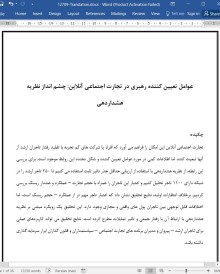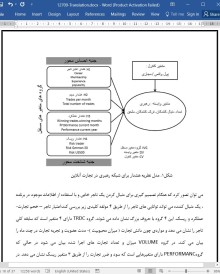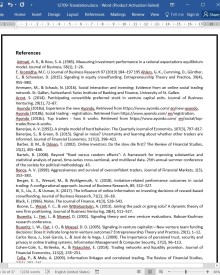
دانلود مقاله عوامل تعیین کننده رهبری در تجارت اجتماعی آنلاین
چکیده
تجارت اجتماعی آنلاین این امکان را فراهم می آورد که افراد یا شرکت های کم تجربه با تقلید رفتار تاجران ارشد از آنها تبعیت کنند اما اطلاعات کمی در مورد عوامل تعیین کننده و شکل دهنده این روابط موجود است. برای بررسی این رابطه، از نظریه هشداردهی با استفاده از ارزیابی حداقل جذر تاثیر ثابت استفاده می کنیم تا 250 تاجر ارشد را در شبکه دارای 1100 تاجر تحلیل کنیم و اعتبار این تاجران را همراه با حجم تجارت – عملکرد و هشدار ریسک بررسی کردیم. برخلاف انتظارات اولیه، نتایج تحقیق نشان داد که اعتبار تاجر مهم تر از عملکرد – حجم ریسک است، اما اختلافات قابل توجهی بین تاجران پول های واقعی و مجازی وجود دارد. این تحقیق یک رویکرد مبتنی بر نظریه هشداردهی با ارتباط آن با رفتار جمعی و تاثیر تمایلات مطرح کرده است. نتایج تحقیق می تواند کاربردهای عملی برای تاجران ارشد – پیروان و مدیران برنامه های تجارت اجتماعی – سیاستمداران و قانون گذاران ابزار سرمایه گذاری داشته باشد.
7. محدودیت ها و جهت گیری تحقیقات آینده
این تحقیق از طریق معرفی یک روش مدیریت شبکه برای نظریه هشدار دهی، به بیان ارتباط بین هشدارهای رهبری، رفتار گروهی و تاثیر تقابل در محیط های شبکه کمک می کند. اهمیت اعتبار فردی و اینکه آیا بقیه هم به یک تاجر بپیوندند یا خیر با حجم و ریسک عوامل تعیین کننده در انسان ها و ماهیت منطقی بازارها دنبال می شود. ما پیوند مفهومی و تجربی بین مدیریت، برنامه های مالی و دیجیتال مطرح کرده ایم اما این عامل فقط نقطه شروع برای تشریح روابط شبکه های پیچیده است که به صورت سه حوزه پوشش داده مطرح می شوند.
برای موقعیت خاص بیان شده در این تحقیق همچنین تحقیقات بیشتری برای بررسی عملکرد زمان بندی شده تاجران ارشد، دنبال کنندگان و توانایی افراد برای تایید ضرر لازم است. این عامل می تواند با بررسی فراتر از اعتماد ( ولگموت و همکاران2016) – تقلید عملکرد اتومات (برگر و همکاران2018) – هشدارها (اوهلر و همکاران 2016) و در نظر گرفتن یک روش سیستم ها برای بررسی واکنش های نواوری و موقعیت های حاصل از مهارت ها و تجربه مدیریت شبکه انجام شود. نقش کلیدی تجارت آنلاین و برنامه های کارآفرینی نیازمند توجه بیشتر است. به دلیل وجود اطلاعات ناقص، نتایج ما نشان می دهد که اعتبار فرد نقش مهمی در انتقال اطلاعات مربوط به توانایی ها ایفا می کند و یکی از عوامل کلیدی اعتماد است. به هر حال، این گونه رفتارها می تواند موقعیت هایی را برای نظارت و بررسی دقیق فراهم آورند. قطعا شرکت ها می توانند از نتایج این تحقیق بهره بگیرند و تاکید خود را متمرکز بر توسعه و گسترش پروفایل های مناسب کنند که ویژگی های منحصر بفرد را منعکس می کنند. قانونگذاران می توانند از این نتیج برای درک بهتر ریسک های احتمالی و آسیب پذیری در بازهای دیجیتال تجارت استفاده کنند.
Abstract
Online social trading offers an opportunity for less-experienced individuals or firms to follow top traders by mimicking their behavior, but little is known about the determinants of leadership that shape such relationships. To study this, we build on signaling theory using fixed-effect panel least squares estimations to analyze 250 top traders in a network of around 1100 traders; we examine their trader credentials, volume of trades, performance, and risk signals. Contrary to our initial expectations, findings show that trader credentials are more important than performance, volume, or risk signals, but there are significant differences between virtual and real money traders. This study proposes a network signaling theory approach by linking it to herd behavior and the disposition effect. Our findings can have practical implications not only for top traders, followers, and social trading platform managers but also for policy-makers and regulators of such investment instruments.
7. Limitations and directions for future research
This study makes a significant contribution by introducing a network leadership approach to signaling theory, evidencing the link between leadership signals, herd behavior, and disposition effect in network environments. The importance of individual credentials, followed by performance and whether other traders join or leave, compared to more rational volume and risk determinants indicates the largely human and, in cases, irrational nature of investments markets. We propose a conceptual and empirical link between leadership, finance and digital platforms, but this is only a starting point to explain the complex network relationships formed as the three fields converge.
In the specific context of this study more research is needed to investigate the timely performance of top traders, joiners or leavers and members' ability to admit loses. This could be done by looking beyond trust (Wohlgemuth et al., 2016), automated performance imitation (Berger et al., 2018), and signals (Oehler et al., 2016) by taking a systems approach to look at innovative entrepreneurial responses and opportunities arising from better analytical skills and network leadership expertise. The key intermediary role of online trading and entrepreneurship platforms deserves more attention. With the existence of imperfect information, our results show that an individual's credentials play a major part in conveying information about his/her competence, which serves as a key element of trust. Such behavior, however, could create opportunities for speculation and exploitation that need to be observed and investigated more closely. Firms can certainly benefit from our results by focusing their efforts on the development of a robust firm-level competence profile that reflects its unique characteristics. Regulators, on the other hand, could reflect on these findings to have a better understanding of potential risks and vulnerabilities in new digital network trading environments.
Hypothesis 1. H1: Leadership in an online trading network is positively related to individual credential signals of top traders.
Hypothesis 2. H2: Leadership in an online trading network is positively related to the volume of trade signals of top traders.
Hypothesis 3. H3: Leadership in an online trading network is positively related to performance signals of top traders.
Hypothesis 4. H4: Leadership in an online trading network is negatively related to risk signals of top traders.
فرضیه 1 (H1 ): رهبری در یک شبکه تجاری آنلاین رابطه مثبتی با هشدارهای اعتبار فردی تاجران ارشد دارد.
فرضیه2 (H2 ): رهبری در یک شبکه تجارت آنلاین رابطه مثبت با حجم هشدارهای تجاری تاجران ارشد دارد.
فرضیه 3 (H3 ): رهبری در یک شبکه تجارت آنلاین رابطه مثبت با هشدارهای عملکردی تاجران ارشد دارد.
فرضیه4 (H4 ): رهبری در شبکه تجارت آنلاین رابطه منفی با هشدار ریسک تاجران ارشد دارد.
چکیده
1. مقدمه
2. نظریه هشدار و رهبری شبکه
3.بیان فرضیه
3.1اعتبار تاجر (TRDC )
3.2حجم تجارت
3.3عملکرد
3.4 ریسک
3.5پول مجازی و پول واقعی
4.طرح تحقیق
4.1.منبع اطلاعات – ساختار نمونه و آمار توصیفی
4.2 ساختار شاخص ترکیبی و دسته بندی گروههای هشدار
4.3.روش تحقیق
4.3.1 مدلسازی ترک و پیوستن
5. نتایج تجربی
5.1 نتایج مدل پایه
5.2 تاجران مجازی و واقعی
5.2.1 تاجران مجازی
5.2.2 تاجران واقعی
5.3 ترک کنندگان و افرادی که به یک تاجر می پیوندند
5.3.1 ترک کنندگان
5.3.2 ملحق شوندگان
6. بحث و نتیجه گیری
7. محدودیت ها و جهت گیری تحقیقات آینده
منابع
ABSTRACT
1. Introduction
2. Signaling theory and network leadership
3. Derivation of hypotheses
3.1. Trader credentials (TRDC)
3.2. Volume
3.3. Performance
3.4. Risk
3.5. Virtual versus real money traders
4. Research design
4.1. Data source, sample composition, and descriptive statistics
4.2. Composite index construction and classification of signal groups
4.3. Methodology
4.3.1. Modeling for leavers and joiners
5. Empirical results
5.1. Baseline model results
5.2. Virtual versus real money traders
5.2.1. Virtual traders
5.2.2. Real traders
5.3. Leavers versus joiners
5.3.1. Leavers
5.3.2. Joiners
6. Discussion and conclusions
7. Limitations and directions for future research
References
- اصل مقاله انگلیسی با فرمت ورد (word) با قابلیت ویرایش
- ترجمه فارسی مقاله با فرمت ورد (word) با قابلیت ویرایش، بدون آرم سایت ای ترجمه
- ترجمه فارسی مقاله با فرمت pdf، بدون آرم سایت ای ترجمه



